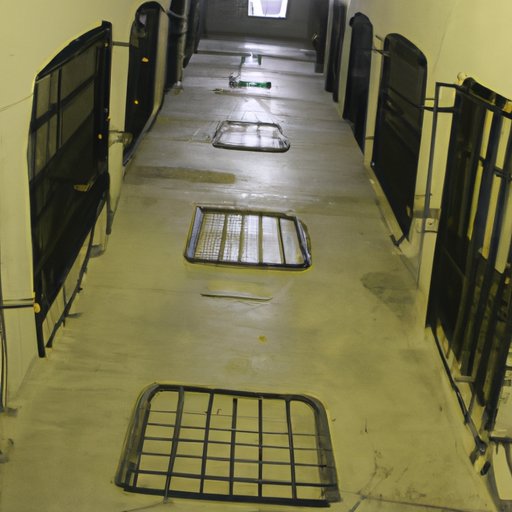Introduction
Prisons are places where people convicted of crimes are held for a specified period of time as punishment for their offenses. The purpose of prisons is to protect society from dangerous criminals and to rehabilitate offenders so that they can be reintegrated into society. Prisons have been around for centuries, but who invented the prison and why? This article will explore this question by looking at the historical development of prisons and examining their impact on society today.

A Historical Overview: Tracing the Origin of Prisons
The idea of prisons has ancient origins, with evidence of incarceration being found in ancient civilizations such as Egypt, Greece, and Rome. However, it was not until the 18th century that prisons began to take the form we know today. During this period, England established its first modern prisons, which were characterized by overcrowding and harsh conditions. This model of prison was then exported to the United States, where it was further developed and refined.
The emergence of modern prisons was largely due to the influence of Enlightenment-era thinkers such as Cesare Beccaria, who argued for a more humane approach to criminal justice. Beccaria’s ideas, which emphasized rehabilitation over punishment, had a major influence on the prison system in Europe and the United States. As a result, prisons began to transform from places of punishment to places of reform and correction.

A Focus on Who Invented the Prison and Why
The invention of the prison cannot be attributed to one single person or event. Instead, it was the result of a long process of development, beginning with the ancient civilizations and ending with the modern prison system. However, there are several key figures and events that played an important role in the creation of prisons.
The most important factor in the development of prisons was the state. Governments began to realize the need for prisons in order to maintain public order and enforce laws. This realization led to the establishment of dedicated prison systems in various countries, with each country developing their own unique approach to incarceration.
The work of influential figures such as Beccaria and Jeremy Bentham also had a major role to play in the development of prisons. Beccaria argued for a more humane approach to criminal justice, while Bentham proposed the Panopticon – a circular prison design that would allow for greater control over inmates. These ideas shaped the modern prison system, making it more humane and efficient.
The main reason for inventing prisons was to protect society from dangerous criminals. Prisons were seen as a way to deter crime and keep criminals off the streets. Over time, however, the purpose of prisons shifted to include rehabilitation, with the aim of helping offenders learn new skills and become productive members of society.
An Exploration of How Prisons Have Evolved Over Time
The modern prison system is vastly different from what it once was. Prisons have undergone numerous changes in terms of design, functionality, and social attitudes towards incarceration. For example, prisons have become more secure, with improved surveillance and security measures. Reforms have also been made to the way prisons operate, with a greater focus on rehabilitation and education.
Social movements such as the civil rights movement and the abolitionist movement have also had a major impact on prisons. These movements have led to greater awareness about the injustices of the prison system and pushed for reforms to make prisons more humane and effective.

A Look at How Prisons Impact Society Today
Prisons have a significant economic, social, and cultural impact on society. On an economic level, prisons are expensive to run and can place a strain on public funds. Prisons also have a social impact, as they can lead to increased recidivism rates and exacerbate issues such as poverty and inequality. Finally, prisons can have a major cultural impact, as they can lead to the stigmatization of certain communities and create a culture of fear and mistrust.
A Study of the Pros and Cons of Prisons
Prison is a controversial topic, with many people arguing for and against it. Those who support prisons argue that they provide a necessary form of punishment and protection for society. They also point to evidence that shows how prisons can help rehabilitate offenders and reduce recidivism rates. On the other hand, those who oppose prisons argue that they are ineffective and create unnecessary suffering for inmates.
Proponents of prison reform also argue that prisons should focus more on rehabilitation and less on punishment. They point to evidence that suggests that providing inmates with educational and vocational training can help them reintegrate into society more easily upon release.
Conclusion
In conclusion, the invention of the prison is a complex phenomenon that cannot be attributed to one single person or event. It is the result of centuries of development, beginning with the ancient civilizations and ending with the modern prison system. Prisons have evolved over time, adapting to changing social attitudes and advances in technology. Prisons have both advantages and disadvantages, with supporters arguing that they provide a necessary form of punishment and protection for society, and opponents arguing that they are ineffective and create unnecessary suffering for inmates.
(Note: Is this article not meeting your expectations? Do you have knowledge or insights to share? Unlock new opportunities and expand your reach by joining our authors team. Click Registration to join us and share your expertise with our readers.)
